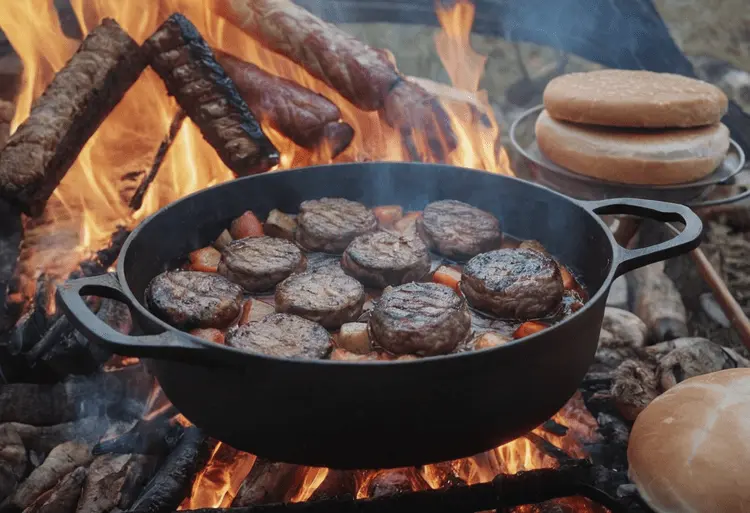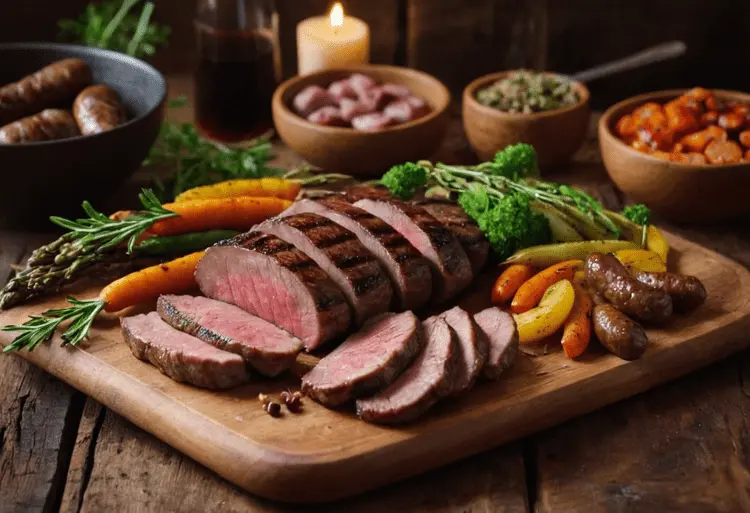Game Meats: Feeling stuck in a rut with the same old chicken, beef, and pork? Your taste buds are craving something more – a culinary adventure with unique flavors and surprising health benefits. Tired of the ethical concerns surrounding factory-farmed meats?
Imagine sinking your teeth into tender venison, savoring the rich taste of wild duck, or exploring meats like wild boar. Game meats offer a flavorful and sustainable protein source packed with nutrients.
Unleash your inner foodie with our guide to game meats: “Game Meats: Your Flavorful & Healthy Protein Adventure.” We’ll explore everything from sourcing ethical, free-range game to cooking techniques that unlock maximum flavor in these lean protein sources.
Game Meats in a Nutshell:
- Wild, not farmed
- Flavorful, not bland
- Healthy, not fatty
- Ethical, not factory
- Adventurous, not boring
Table of contents
Welcome to the World of Game Meats

Ever wondered what’s on the menu beyond beef, chicken, and pork? Have you considered exploring the world of game meats? If you’re seeking a culinary adventure that’s both delicious and nutritious, you’re in for a treat.
What Exactly is Game Meat?
Game meat is sourced from wild animals hunted for food. This sets it apart from domesticated livestock raised on farms.
Think deer, elk, bison, wild boar, duck, quail… the list goes on! Curious about the environmental impact of your food choices? Discover how game meat fits into the broader picture of sustainable and ethical eating.
Why Choose Game Meat? A Nutritional Powerhouse
Game meats are nutritional powerhouses, often leaner and lower in saturated fat than their domesticated counterparts. They’re packed with essential vitamins and minerals like B vitamins, iron, zinc, and selenium.
And for those watching their weight, game meat can be an excellent addition to a healthy diet.
More Than Just Lean Protein
But it’s not just about the macros. Game meats offer a unique flavor profile, often described as “gamey.” This distinct taste varies depending on the animal and its diet. It’s a culinary adventure waiting to happen!
Tell Us Your Thoughts!
Have you tried game meat before? What’s your favorite way to prepare it? Share your thoughts and experiences in the comments below or tag us on social media. We love hearing from our readers!
Ready to transform your game meat adventure into a weight loss journey? Discover the power of protein with our ultimate list of lean, satisfying options that will fuel your body and tantalize your taste buds.
Types of Game Meats: A Culinary Adventure Awaits!
Ever wondered what a bison steak tastes like compared to beef? Or if duck is really as fatty as they say? Game meats offer a world of flavor and nutrition that go beyond the ordinary.
Let’s dive into the most popular types, and you might just discover your new favorite protein source!
Red Game Meats: Lean, Mean, and Flavor Machines
Venison (Deer): The king of game meats, venison boasts a lean profile with a rich, earthy flavor that’s not overly gamey. From tenderloin to backstrap, each cut offers a unique culinary experience.
Want to know the secret to cooking the perfect venison steak? Low and slow is the way to go!
Elk: This majestic creature yields meat similar to beef but leaner, with a slightly sweeter taste. Elk steaks, roasts, and burgers are all excellent choices for a hearty meal. Did you know that elk is a fantastic source of iron and B vitamins?
Bison: Bison meat offers a robust, slightly sweet flavor with a tender texture similar to beef. It’s lower in fat and cholesterol than beef, making it a healthier alternative. Want to try a unique burger? Swap out beef for bison for a leaner, more flavorful patty.
Wild Boar: This wild pig boasts a rich, nutty flavor with a hint of sweetness. It’s a versatile meat that’s delicious in stews, sausages, and even ground for burgers. Cooking wild boar for the first time? Slow cooking or braising is your best bet to ensure tenderness.
Curious about the nutritional differences between these red game meats? Check out this comprehensive comparison of game meat nutrition.
Game Birds: Flavorful, Delicate, and Oh-So-Versatile
Duck: With its rich, succulent flavor and crispy skin, duck is a favorite among game meat enthusiasts. Duck breast, confit, and even duck fat fries are culinary delights worth exploring.
But is duck really as fatty as everyone says? Yes, but that’s what makes it so flavorful! Render the fat during cooking for a crispy, delicious result.
Pheasant: This lean and delicate bird offers a mild, slightly sweet flavor that’s often compared to chicken. Roasted pheasant, pheasant pot pie, or even pheasant fajitas are all tasty options.
Want to impress your dinner guests? Serve up a roasted pheasant with wild rice and cranberries for a truly elegant meal.
Quail: These tiny birds pack a big flavor punch! They’re known for their delicate, slightly sweet taste and tender texture. Grilled, roasted, or pan-fried, quail are a delightful treat. Looking for a fun appetizer?
Try quail eggs deviled or wrapped in bacon for a bite-sized explosion of flavor.
Other Game Birds: Don’t forget about goose, partridge, woodcock, and other feathered game. Each offers a unique flavor profile worth exploring.
Sourcing, Preparing, and Cooking Game Meats

Ever wondered how to get your hands on the freshest, most flavorful game meats? Or maybe you’re curious about the best ways to transform them into culinary masterpieces?
Sourcing Game Meats: Where’s the Wild Flavor?
Hunters, take note: Bagging your own game is the ultimate way to ensure quality and freshness. But remember, be a responsible hunter and follow all regulations.
Not a hunter? No worries! Specialty butchers and farmers markets often carry a variety of game meats. Don’t be afraid to ask questions about the source and how the animal was raised.
Prefer online shopping? Many reputable online retailers offer a wide selection of game meats, delivered right to your doorstep.
Did you know? Game meats are often leaner and lower in saturated fat than conventionally raised meats. This makes them an excellent choice for health-conscious individuals.
Preparing Game Meats: From Field to Kitchen
Butchering basics: If you’re a DIY enthusiast, learning basic butchering skills can be incredibly rewarding. It allows you to fully utilize the animal and understand the different cuts available.
Aging for flavor: Did you know that aging game meats can enhance their tenderness and flavor? There are different methods, from dry aging to wet aging, each with its unique benefits.
Marinating magic: Marinating game meats can help tenderize them and infuse them with delicious flavors. Experiment with different marinades to discover your favorites.
Cooking Game Meats: Unleash Your Inner Chef
Grilling and smoking: Game meats are perfect for grilling or smoking, adding a smoky, charred flavor that complements their natural richness.
Roasting and braising: For tougher cuts, roasting or braising low and slow can work wonders, resulting in tender, melt-in-your-mouth dishes.
Pan-searing and sautéing: Delicate cuts like venison tenderloin or quail breasts shine when pan-seared or sautéed quickly.
Get creative: Don’t be afraid to experiment with different recipes and techniques. The possibilities with game meats are endless!
Share your culinary adventures: Have you cooked with game meats before? We’d love to hear about your experiences and favorite recipes. Share your photos and tag us on social media!
Game Meats in the Culinary World
Ever wondered how top chefs transform wild game into culinary masterpieces? Or perhaps you’re curious about the unique flavors and textures that set game meats apart in fine dining?
The culinary world is abuzz with the resurgence of game meats, and for good reason. These lean, nutrient-dense proteins offer a flavor adventure like no other.
From Michelin-starred restaurants to cozy gastropubs, chefs are embracing game meats’ versatility and incorporating them into innovative dishes.
Game Meat Elevates Fine Dining Experiences
Have you had the pleasure of savoring a perfectly cooked venison tenderloin with a huckleberry reduction? Or perhaps a succulent duck breast with wild mushroom risotto tantalized your taste buds?
These are just a few examples of how game meats elevate fine dining experiences. Chefs are pushing culinary boundaries, experimenting with unique preparations and pairings that showcase the distinct flavors of wild game.
Dedicated Restaurants Championing Game Meats
In addition to gracing the menus of upscale establishments, game meats are also finding a home in restaurants dedicated to showcasing their unique qualities.
These establishments often source their game meats locally, supporting sustainable hunting practices and promoting ethical consumption. Have you ever dined at a restaurant that specializes in wild game? We’d love to hear about your experience!
A Flavor Symphony: Pairing Game Meats with Wine and Beverages
Game meats, with their rich, complex flavors, call for thoughtful pairings with wine and other beverages. Sommeliers are experts at curating the perfect pairings to complement the unique characteristics of each game meat.
Imagine sipping a robust red wine alongside a hearty bison stew or enjoying a crisp white wine with a delicate pheasant dish. The possibilities are endless!
The Green Choice: Game Meats and Sustainability
Sustainable Protein: A Hot Topic
Ever wondered about the environmental impact of your food choices? The carbon footprint of our meals is a growing concern for many. But could the answer to a more sustainable diet be found in the wild?
Game Meats: Lighter on the Planet?
Game meats, like venison and bison, are often raised in their natural habitats, with minimal environmental intervention. Unlike conventional livestock farming, they don’t require large amounts of land, water, or feed.
This means a significantly smaller carbon footprint compared to beef or pork. In fact, a 2023 study published in the Journal of Environmental Science and Technology revealed that game meat production can generate up to 96% less greenhouse gas emissions than beef.
The Healthier Choice: Nutrients and Flavor
Those meats not only benefit the planet but also your body! They’re leaner and packed with essential nutrients like iron, zinc, and B vitamins. Plus, the unique flavors offer a delightful culinary adventure.
So, by choosing those meats, you’re nourishing your body while reducing your environmental impact. A win-win situation, wouldn’t you agree?
Conservation Heroes: Hunters and Game Management
Responsible hunting plays a crucial role in maintaining healthy ecosystems and wildlife populations. By managing animal numbers, hunters help prevent overgrazing and protect biodiversity.
Additionally, hunting licenses and fees contribute to conservation efforts, supporting wildlife research and habitat restoration projects.
Conclusion:

Are you ready to embark on a culinary adventure that’s as delicious as it is responsible?
Game meats offer a world of flavor, nutrition, and sustainability, waiting to be explored. From the lean, iron-rich venison to the succulent wild duck, each bite connects you to a rich history and a brighter future.
But is game meat really healthier? Absolutely! Research shows it’s often lower in fat and calories than traditional meats, while packing a protein punch and essential nutrients like iron, zinc, and B vitamins.
Plus, choosing sustainably sourced game supports a healthier planet and a more ethical food system.
So, are you ready to answer the call of the wild?
- Get cooking: Try one of the many recipes we’ve shared and experience the unique flavors of game meat for yourself.
- Shop smart: Seek out reputable sources like local farmers and specialty butchers to ensure you’re getting high-quality, sustainably harvested game meat.
Ready for another daring food adventure? After exploring the world of game meats, discover the controversial Meat and Fruit Diet. Is it a healthy revolution or a fad with risks? Let’s dive into the science and find out if this diet is right for you!
Your Burning Questions About Game Meats – Answered!
Curious about game meats? Let’s dive into the most common questions:
Game meat comes from wild animals. Think venison (deer), duck, elk, or even wild boar!
The list is long and wild! It ranges from common options like duck and rabbit to more choices like alligator or ostrich.
Nope, chicken is a domesticated bird raised on farms, not in the wild.
It’s all about personal taste! Venison is a popular choice for its versatility and leanness. But don’t be afraid to branch out and explore new flavors!
Absolutely! When sourced and prepared correctly, game meat is a safe and healthy protein source.
Check your local butcher, farmers market, or specialty online retailers. Hunting is also an option for the adventurous!
Often, yes! Game meats are typically lower in fat and calories while offering more essential nutrients.
Marinate, slow cook, or use moist-heat methods like braising. Proper cooking temperatures are key.
Prices vary depending on the animal, cut, and source. It’s an investment in unique flavors and nutrition.
Game meats are naturally gluten-free and fit well into many diets like paleo and keto.